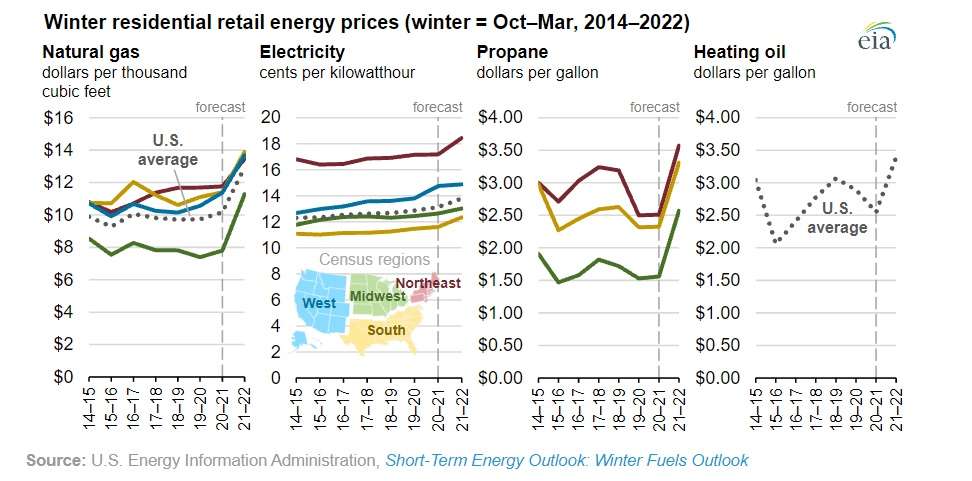Keeping Warm This Winter Could Be More Costly As Inflation Heats Up
Plus: Psychedelic entrepreneurs, American seafood stuck in Canada, and more...

Rising inflation and higher demand for fuel mean most Americans will see big increases in their winter heating bills this year, the U.S. Department of Energy warns in a report released Wednesday.
About half of American households rely on natural gas for heat, and they will pay about 30 percent more for heat than last year—and perhaps as much as 50 percent more if the winter is 10 percent colder than expected, the department estimates. That means the average family that relies on natural gas to stay warm this winter will shell out $746 between October and March, up from an average of about $570 last year. Homes heated with propane or heating oil, which account for about 9 percent of U.S. households, will also see costs rise by more than 40 percent, while homes heated with electricity can expect a smaller increase of about 6 percent over last year.
"The looming increase, on top of rising prices for many consumer goods and commodities, is likely to cause stress for Americans at many income levels. Economists warn that the larger utility bills are most likely to affect those households still hobbled by the Covid-19 pandemic," reports The Wall Street Journal.
The sharp increase in expected home-heating costs is partially a function of lower-than-normal prices last year, as the pandemic caused demand for fuels of all types to fall during 2020 and prices slid downward accordingly. But the forecasts for the coming winter expect prices to be well above their 2019 baselines too:

Fuel costs are one of the driving factors behind the stubbornly high levels of inflation the country is facing right now. Wednesday's monthly report of the consumer price index showed year-over-year inflation of 5.4 percent, with energy prices up more than 24 percent in the past 12 months.
BREAKING: Inflation was up 5.4% over last year in September – the highest rate in 13 years.
Prices rose 0.4% in Sept, up from 0.3% in August
Gas, food and goods continue to be key drivers of inflation. Used car prices fell slightly but remain 24% higher than last year. pic.twitter.com/8cN1eHaBvQ
— Heather Long (@byHeatherLong) October 13, 2021
High energy prices are a global problem right now. In Europe, the price of gasoline has soared in recent months and energy prices as a whole are rising—though part of the problem is a complex pricing scheme imposed by the European Union that disrupts price signals to consumers, the Financial Times notes. The entire country of Lebanon was without electricity last weekend as the state-run electrical grid collapsed temporarily.
Anne Bradbury, CEO of the American Exploration & Production Council, a trade association representing energy companies, said in a statement that the situation in Europe should be a warning to the Biden administration as it considers plans for higher taxes and new regulations that will only keep increasing energy prices. "By pursuing policies that restrict supply and make it harder to produce oil and natural gas here in America, Americans will have to pay more for their energy," she said.
There's a lot of speculation that current levels of inflation are actually undercounting what's happening in the economy right now. So-called shadow inflation is occuring in ways that might not show up in the consumer price index—instead of raising prices, for example, some businesses might cut back on services or simply take longer to get things done.
"The 2021 version of many services isn't quite the same as the 2019 version. But statisticians have treated them as the same, even though some of them have gotten dramatically worse, because they don't have a rigorous way to measure how much worse they've gotten," writes Alan Cole, a former senior economist with the Joint Economic Committee of Congress, in his Full Stack Economics newsletter. "The result has been extra inflation on an unmeasured quality dimension: rather than paying more for the same good, in many places, you instead pay the same for something less than what it used to be."
Shadow inflation can't really happen in the energy sector, so Americans are feeling the full brunt of rising prices. Now, we're facing an expensive winter. Even without any added burdens from federal policy makers who hike prices or crimp supply, fuel prices serve as a stark reminder that rising inflation—which could be here to stay for longer than anyone would like—has serious consequences for just about everyone.
FREE MINDS
Field Trip, a Canadian startup, is betting that more Americans would be willing to try psychotherapy with drugs like MDMA and psilocybin. The company runs clinics in Los Angeles, New York City, and Toronto, but has ambitious plans to open 75 other locations over the next three years, Vox reports:
Although ketamine is legal if prescribed by a doctor, the Drug Enforcement Agency (DEA) lists psychedelics like psilocybin and MDMA in schedule 1 of the Controlled Substance Act, which says they have no medical value and a high potential for abuse. But there's also growing evidence that psychedelics could lead to game-changing medications and, when combined with conventional therapy, may help people who aren't seeing results through currently available treatments. Several US cities have already decriminalized psilocybin, the active ingredient in magic mushrooms, and the Food and Drug Administration (FDA) is overseeing clinical trials into using psychedelics to treat PTSD and depression.
This potentially revolutionary approach to mental health also represents a tremendous commercial opportunity for health care and pharmaceutical companies. But despite promising, privately funded studies into psychedelics, current government regulations prevent the wider availability of psychedelic therapy.
And read Reason's Nick Gillespie on how the slow-rolling legalization of MDMA and other psychedelic drugs is creating opportunities for investors and individuals who want to expand their perspectives.
FREE MARKETS
There is no simple solution to the problems plaguing supply chains right now, but the Jones Act is only making things worse:
Millions of pounds of Alaskan seafood have been trapped in Canada for weeks, thanks to the Jones Act. But on Sunday a federal judge said the supply chain can get moving again. https://t.co/0gkLh4AwR9
— Veronique de Rugy (@veroderugy) October 12, 2021
QUICK HITS
• The Food and Drug Administration will vote Thursday on whether to recommend an emergency authorization for COVID-19 booster shots for people who got the Moderna vaccine. A vote on Johnson & Johnson vaccine boosters is expected on Friday.
• Katie Couric admits she's a hack.
• Former President Donald Trump has a bold strategy for the 2022 and 2024 elections:
Trump is now calling on Republicans not to vote — declaring "Republicans will not be voting in '22 or '24" if his election fraud hoax is not "solved" first. He helped Republicans lose two Georgia Senate seats in January. Now he seems ready to try it again in the midterms. pic.twitter.com/ARBnsfwmzJ
— Jonathan Karl (@jonkarl) October 13, 2021
• Czech voters defeat a populist.
• Playing video games isn't correlated with a drop in personal well-being:
New preprint: "Time spent playing video games is unlikely to impact well-being" from us (@NiklasJohannes, @krstoffr, & @ShuhBillSkee & me) at @oiioxford.
We studied the game play and well-being of 38k players of six popular titles over six weeks. https://t.co/Td54rpxJ8r [1/7] pic.twitter.com/EwgLdHKkYi
— m@tti (@vuorre) October 11, 2021
• There may be more shoes to drop after NFL coach Jon Gruden's firing over homophobic remarks made in emails. The NFL players union is asking the league to make public more than 650,000 emails that it collected during an investigation into workplace misconduct.
• Captain Kirk went to space yesterday and was profoundly moved by the experience.
• Nokia will re-release its classic "brick" cellphone in honor of the device's 20th anniversary. Yours probably still works.


Show Comments (391)